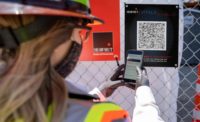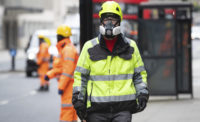There’s no end to published opinions about construction project shutdowns where the widely different types of jobsites are reduced to a single Dickensian nightmare crying out to be closed during this COVID-19 pandemic.
Some had wondered why luxury high-rise projects were still staffed in Manhattan, at least before New York state's latest closure order, when Times Square is as deserted as the Bonneville Salt Flats. The reason is that not all construction workplaces are the same.
The situation in every city and state will differ, too. The goal of ending the pandemic may prevail in many places and all construction may have to stop.
If any worker is worried about contracting the virus and bringing it home, he or she should be excused—no questions asked.
The situation in every city and state will differ, too. The goal of ending the pandemic may prevail in many places and all construction may have to stop.
But there are many projects where tough new standards are being observed so that work is done safely. If jobsite crews are crowding into an elevator, the craftworkers stand back and wait.
If the carpenters can’t wrestle a window frame into position without standing shoulder to shoulder, they put it off and go to another task. Subcontractor start times can be staggered and shift premiums relaxed.
Many owners and contractors are making sure the masks, hand sanitizer, thermometers and other equipment are where they need to be; otherwise, no one can work safely. If the wipes and paper towels aren’t in abundant supply, managers can’t expect workers to be productive. Just as with work tools, these are the employer’s responsibility to provide.
[For ENR’s latest coverage of the COVID-19 pandemic, click here]
What about the project superintendent who recently wrote that his company’s owner is continuing to work in order to avoid liquidated damages? We don’t believe courts will enforce many liquidated damage claims, even in the absence of a clear state or federal order to stop work, over delays that began in pandemic conditions.
What about the superintendent’s argument that in ordinary times he has to keep reminding his crews to use their personal protective equipment? It’s sad, but that’s not how construction is everywhere. Many, but not all, construction workers understand that they are professionals with a responsibility to their fellow workers, families and themselves to build safely, follow rules and look after one another.
After several warnings—the exact number depends on the situation—anyone who can’t keep to the pre- or pandemic-time safety routine (PPE, social distance, no showing up while sick), needs to be walked to the project gate and told, “Maybe we’ll see you another time on another job.”
At some other jobsites, employers at utility and pipeline companies have qualified people taking temperatures and asking health questions at the gate; masks are ample, wipes abundant and hand sanitizer flows like a river. Tool-sharing without decontamination is prohibited. Everywhere they can be, workers are separated to work in isolation. Wash-up sinks are added. Lunch spaces are expanded. And any construction crew is separated from the public or any plant crew still working.
One project manager told us that site employees sent thank-you notes daily to her CM firm's managers for COVID-19 precautions they took at their New York City jobsites.
As a test of the project’s virus hygiene protocols, a company’s top managers or owners ought to gear up and walk the jobsite themselves.
Continuing to work under these tough new safety requirements will lead to conflicts, for subcontractors especially. But it’s the prime contractor’s responsibility to keep things going and a mutual obligation to provide a safe workplace.
Construction can be a dirty job, as some criticisms of ongoing work have pointed out. But the conditions are not universally that of a 19th Century coal mine.
Let’s not penalize the safe jobsites. A pandemic-ready jobsite could be safer than the local Stop ‘n Shop. If it’s not, shut it down.
New Jersey Gov. Phil Murphy has decided that construction is essential and has avoided a full state shutdown as has happened elsewhere in the U.S., despite its rising COVID-19 case numbers.
Says one industry official there, “if he sees evidence that social distance can’t be maintained, he can revisit this and he will. The governor has put it on industry to take care of itself. We think we can do that.”
We hope everyone makes wise decisions.




